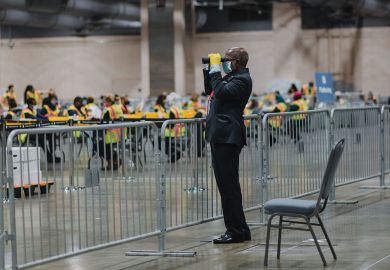Tension between the US and China could fuel a reordering of research networks to the benefit of major higher education systems in continental Europe, a leading scholar has predicted.
The two countries collaborate on research more than any other nations, but Simon Marginson, professor of higher education at the University of Oxford and director of the Centre for Global Higher Education, said this relationship is “being fractured and will be diminished”.
He added that “both sides will lose” from weakening cooperation “because it’s like taking half your research team out”, but they were also both strong enough to operate on their own. Meanwhile, the winners are likely to be strong research systems in Europe.
“The Chinese will probably go to Germany and the US will work more with Europe as well,” he said. “My sense is that Europe is a lot stronger than it was 20 years ago and [even] 10 years ago because the European research system has built more and more really high-quality work in smaller places like Switzerland, the Netherlands and Nordic countries.
“Germany is great in the physical sciences, [and] at the moment Germans have lines open to both countries [China and the US].”
However, there are signs that Germany is becoming more wary towards Chinese government influence on campuses. In July, the University of Hamburg cut ties with its Confucius Institute over fears that Beijing could use it as a “propaganda instrument”.
Professor Marginson said that “world science has got a long way to run in terms of how it evolves strategically” and “who is working with who”, but he said that the US-China relationship was an example of “how, when the chips are down, national political factors can change the global relationships”.
While bottom-up global cooperation has been very dynamic, it is also “fragile”, whereas national systems are “robust”, he added.
“In 2015, [science] was probably getting more global. But I think the last two to three years there has been a reassertion of national policy control, in the US especially,” he said.
Professor Marginson predicted that the US and China would remain “at loggerheads” under a Joe Biden administration.
“I suspect the US as a country has decided to confront China essentially and keep it in its box. Biden will be a better diplomat and a smarter politician offshore [than Donald Trump], but in this area I think it’s competition, not cooperation,” he said.
However, Professor Marginson also said that the rise of east Asia more generally “makes the global research system even more open”.
“What’s been striking is the way in which the networked environment facilitates the emergence of new players,” he said.
“Having really big non-Euro-American players on the scene – like China, Korea and Japan – does create a more open environment…It used to be that research was a very tight-knit network between North America and Europe [and a few outliers]. Now you can make a really successful science system without necessarily subordinating yourself to the US or Germany or the UK, because there are others you can work with.”
Register to continue
Why register?
- Registration is free and only takes a moment
- Once registered, you can read 3 articles a month
- Sign up for our newsletter
Subscribe
Or subscribe for unlimited access to:
- Unlimited access to news, views, insights & reviews
- Digital editions
- Digital access to THE’s university and college rankings analysis
Already registered or a current subscriber?








